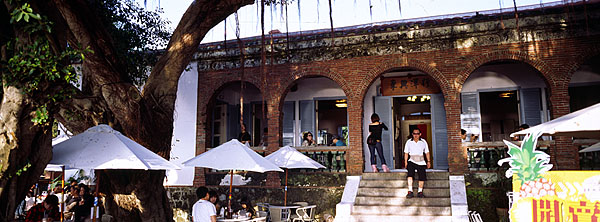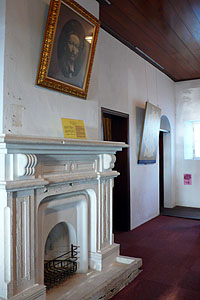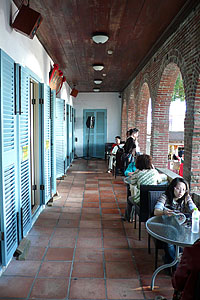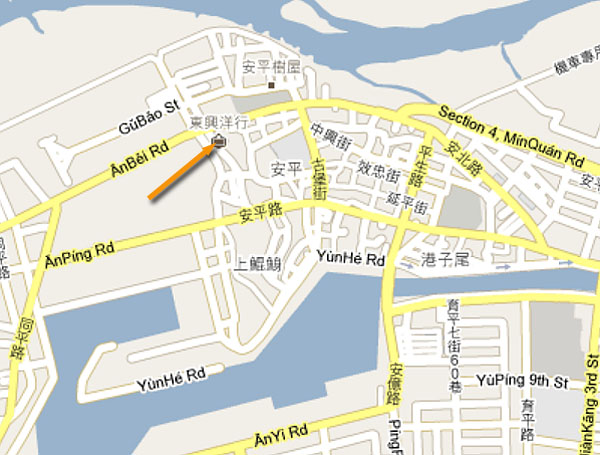Julius Mannich Merchant House
Julius Mannich Merchant House (Dōngxīng Yángháng 東興洋行)
Foreigners were barred from trading in Taiwan for most of the Qing dynasty, but the 1858 Treaty of Tianjin forced open four harbors in Taiwan to foreign traders. Anping was one of them. The five big foreign trading companies of the time were Bains & Co., Boyd & Co., Tait & Co., Wright & Co., and Julius Mannich & Company. Of those five, only the buildings of Julius Mannich & Co. and Tait & Co. remain.
Julius Mannich was a German businessman who set up business in Anping and the Shao Chuan Tou area of Kaohsiung. Like most of the other traders in Tainan, he specialized in the camphor and sugar trades. Construction began on his merchant house in Anping in 1875, a few years after fellow companies like Tait & Co. Most of these companies enjoyed success for the decades they were in operation up until Taiwan was ceded to Japan in 1895. The cession rendered the Treaty of Tianjin meaningless, but the Japanese did not immediately remove the foreign merchants. They simply made life difficult for them by making the trade of camphor and opium a government business. Julius Mannich & Co. folded, and in 1901, the Japanese turned the merchant house into the Anping District Office. In 1920, the building became a police office. After the arrival of the KMT, the house was used as the dormitory of the salt works manager. Since 1986, the Julius Mannich Merchant House has been a small museum. A beer garden style restaurant was added a few years ago.
The building is one of the few examples of European colonial architecture left in Taiwan. It is about 70 feet long and maybe 30 feet wide, rising above the ground on a stone foundation that has circular vents in it for cooling. A distinctive feature is the long front veranda with a brick arcade along the front of it and large windows with shutters at the back. The house also has indoor fireplaces, which were certainly an uncommon feature in homes of southern Taiwan. There is a large front yard with a couple of large banyan trees in it that is curtained by a brick wall. Compared to the Tait & Company building, it is a small structure and it lacks as a museum. You can wander freely around the house, view the architecture and the handful of exhibited items, but much of the focus is on educating Taiwanese about German culture. Luckily, it is free of admission.
In recent years the museum has become a backdrop for the German beer garden and restaurant that has developed in the front yard. It’s a bit disturbing to the historic feeling of the place, but it makes for a nice spot to get a bite to eat under the trees. German food and beer are both served. At the very least, the beer is authentic. There’s also an assortment of coffees, soft drinks, snack food, sandwiches, and curries on offer. Drink prices range from NT$30 to $120 for soft drinks and coffees, NT$70 to $180 for bottled beer, and you can get a stein for NT$370. The curries are all over NT$200 a plate. Snacks and sandwiches run between about NT$35 for onion rings to NT$150 for a submarine sandwich using ingredients imported from Germany. Specialty German dishes run from NT$200 for a German sausage plate to NT$580 for the German Royal Assorted Dish that includes pigs feet and Teutonic sausage. For more information on the restaurant, you can check out their website. The English selection doesn’t seem to work, but the orientation video under the news section is amusingly cheesy.
The Julius Mannich Merchant House is a short walk to the west of Anping Old Fort, and not far from Tait & Co.
Hours: Sunday ~ Thursday 10:00AM ~ 10:00PM; Friday and Saturday 10:00AM ~ 12:00 midnight.
Phone: (06) 2281000
Location: No.3, Lane 233, Anbei Road (安北路), Anping District, Tainan City




Hi,
is there any literature in mandarin, english or probably german about the Company and the trading outpost?
Thank you in advance,
Hendrik
I’m not sure. I imagine you could find some documents in Mandarin in Taiwan, but there’s not much written in English about these old trade companies.